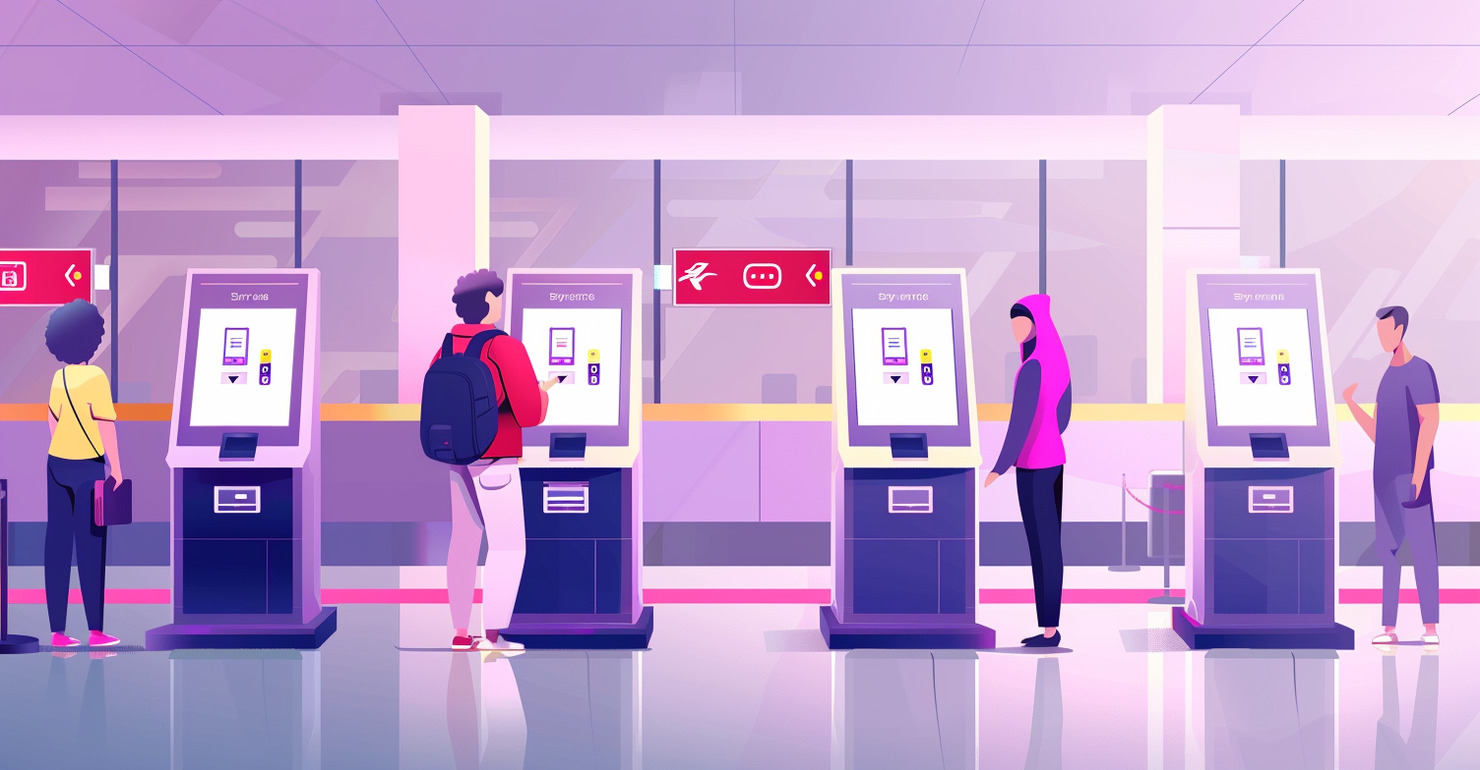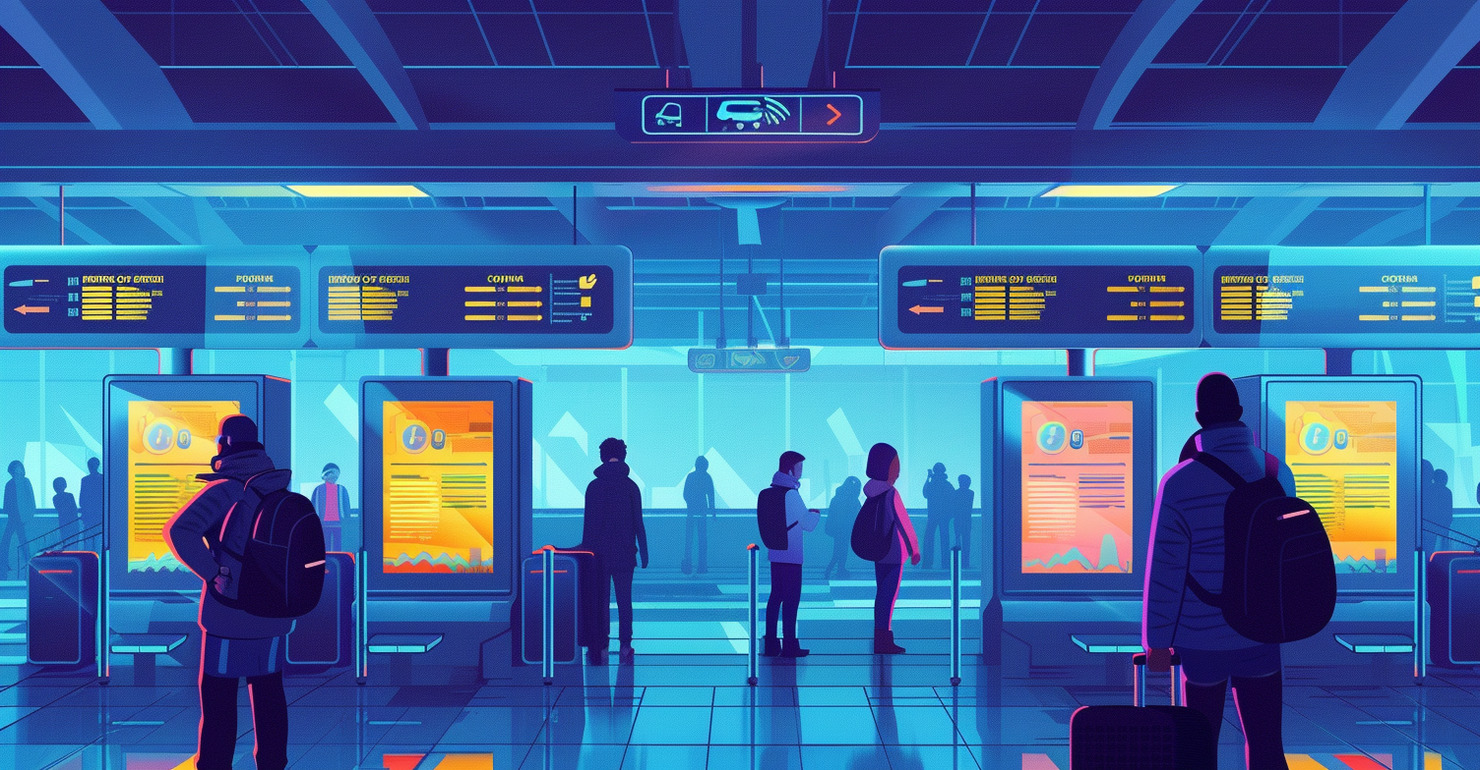
Enhancing Passenger Experience with AI-Driven Services
The aviation industry is undergoing a significant transformation with the integration of artificial intelligence (AI) to revolutionize the passenger experience. AI-powered technologies are streamlining procedures, offering personalized travel assistance, automating boarding processes, improving baggage handling systems, and assessing passenger health status. These advancements aim to enhance safety, efficiency, and satisfaction for travelers.
In this article, we will explore the role of AI in revolutionizing the passenger experience, its application in personalized travel assistance, automated boarding processes, language translation services, baggage handling systems, and passenger health status assessment. Additionally, we will discuss the future of AI in further enhancing the passenger experience.
By leveraging AI-driven services, airports can provide a seamless and customized travel experience, breaking down barriers and increasing passenger satisfaction. Let’s delve into the details and explore how AI is transforming the aviation industry for the better.
The Role of AI in Revolutionizing Passenger Experience
The integration of artificial intelligence (AI) is playing a vital role in revolutionizing the passenger experience in the aviation industry. By leveraging AI-driven technologies, airports aim to enhance safety, efficiency, and overall customer satisfaction.
AI-powered systems streamline procedures, providing passengers with personalized travel assistance that caters to their individual needs. From booking flights to receiving recommendations on airport services, AI travel assistants offer a customized experience that enhances satisfaction.
Automated boarding processes, including biometric identification, further improve the passenger experience by reducing queues and wait times. Additionally, AI-driven language translation services break down language barriers, facilitating communication between travelers and locals, enhancing the travel experience in international settings.
Furthermore, AI is transforming baggage handling systems, increasing efficiency, and reducing the risk of mismanagement. With AI-powered algorithms and robotics, airports can effectively handle the growing passenger volume, improving the overall baggage handling process.
In light of the COVID-19 pandemic, AI is also being adopted for assessing passenger health status. Digital processes and procedures are being utilized to identify potential health risks and ensure the safety of travelers.
Overall, AI is revolutionizing the aviation industry by leveraging advanced technologies to enhance safety, efficiency, and the passenger experience. With continuous advancements, AI-driven services will further enhance the journey for travelers, making air travel safer, more efficient, and more enjoyable.
AI-Driven Personalized Travel Assistance
AI-driven personalized travel assistance is a key component in enhancing the passenger experience in the aviation industry. With the help of AI travel assistants, passengers can enjoy a tailored journey that caters to their individual needs, resulting in increased satisfaction.
These AI travel assistants offer a range of services, from assisting with booking flights to providing recommendations on airport services and amenities. By analyzing passenger preferences, AI algorithms can deliver personalized recommendations for activities, dining options, and even exclusive offers, creating a truly customized travel experience.
Furthermore, AI-powered language translation services break down language barriers, allowing travelers to communicate with locals seamlessly. Whether it’s translating signs, menus, or conversations, these AI-driven solutions support international travel and enhance the overall experience for passengers.
Additionally, AI travel assistants can provide real-time updates on flight status, gate changes, and other relevant information, ensuring passengers stay informed throughout their journey. They can also assist with navigating through the airport, guiding passengers to the correct terminals, gates, and amenities.
By offering personalized travel assistance, AI-driven solutions improve efficiency, reduce stress, and enhance the overall satisfaction of passengers. With continuous advancements in AI technology, airports can create a seamless and customized travel experience, making air travel more enjoyable and convenient for passengers worldwide.
Automated Boarding Processes and Language Translation Services

Automated boarding processes and language translation services are key components in enhancing the passenger experience with AI-driven services in the aviation industry.
The integration of biometric identification and AI technologies has revolutionized the boarding process. Passengers can now enjoy a seamless and efficient boarding experience through automated gates that verify their identity using facial recognition or fingerprint scanning. This not only reduces queues and wait times but also enhances security levels by ensuring that only authorized individuals board the aircraft.
Furthermore, AI-driven language translation services break down language barriers, facilitating effective communication between travelers and locals. Language translation apps and devices powered by AI algorithms accurately translate signs, menus, and conversations in real-time, enabling smooth interactions and improving the overall travel experience, especially in international settings.
These AI-driven advancements in boarding processes and language translation services contribute to a more efficient, secure, and inclusive aviation environment. Passengers can experience hassle-free boarding and seamless communication, making their journey more convenient and enjoyable.
AI-Powered Baggage Handling Systems
AI-powered baggage handling systems are revolutionizing the efficiency and reliability of luggage management in airports, ultimately enhancing the passenger experience.
Traditionally, baggage handling has been a complex process involving manual labor and potential errors. However, with the integration of AI, airports now employ advanced algorithms and robotics to streamline the handling of passengers’ luggage.
These AI-powered systems can effectively count bags, check weights, balance loads, and screen suitcases for security purposes. By automating these processes, airports can significantly reduce the risk of mismanagement, minimize loss, improve tracking accuracy, and expedite the delivery of passengers’ belongings.
The implementation of AI-driven baggage handling systems also provides real-time updates and notifications to passengers, allowing them to track the location of their luggage throughout the journey. This transparency and reliability enhance customer satisfaction and reduce anxiety regarding lost or mishandled bags.
As passenger numbers continue to grow, AI-powered baggage handling systems play a crucial role in managing the increasing demand. By optimizing efficiency, minimizing errors, and reducing manual labor, these systems contribute to faster check-in and shorter waiting times, resulting in a smoother and more enjoyable travel experience for passengers.
In conclusion, AI-powered baggage handling systems revolutionize luggage management in airports. With increased efficiency and reliability, these systems enhance the overall passenger experience, providing peace of mind and ensuring a seamless journey from check-in to baggage claim.
The Adoption of AI for Passenger Health Status Assessment
The adoption of AI for passenger health status assessment has become increasingly crucial in enhancing the overall passenger experience in airports, particularly in light of the COVID-19 pandemic.
With the outbreak of the pandemic, airports have been implementing digital processes and procedures to assess and identify the health status and risks of travelers. AI technologies play a significant role in automating these processes, ensuring the safety of passengers and airport staff.
AI-driven systems can analyze various health-related factors, such as temperature screenings, facial recognition for mask compliance, and contactless check-ins, to assess a traveler’s health status and potential risks. These technologies allow airports to detect potential health threats efficiently and take necessary measures to mitigate them.
The use of AI in passenger health status assessment enhances safety by minimizing the risk of contagion and ensuring that only healthy individuals are allowed to travel. It also provides peace of mind to passengers, knowing that airports are taking proactive steps to prioritize their well-being.
Furthermore, AI-powered technologies enable real-time monitoring and tracking of health data, allowing immediate response and containment measures if any health-related issues arise during the travel journey. This facilitates a rapid and coordinated approach in managing potential health risks.
By adopting AI for passenger health status assessment, airports can maintain a safer environment, instill confidence in travelers, and contribute to overall public health efforts. As technology continues to advance, AI-driven solutions will play an increasingly vital role in ensuring a seamless and secure travel experience for passengers worldwide.
The Future of AI in Enhancing Passenger Experience

The future of AI in enhancing passenger experience is promising and holds immense potential for further transformation in the aviation industry.
One area where AI is expected to have a significant impact is in the realm of personalized services. AI algorithms are becoming increasingly sophisticated in understanding individual preferences and behaviors. This will enable airports to offer highly personalized recommendations and services to passengers, ensuring a more tailored and satisfying travel experience.
Moreover, AI-powered virtual assistants and chatbots are likely to become even more prevalent, providing instant assistance and information to passengers throughout their journey. These virtual assistants can offer real-time updates, answer queries, and provide personalized recommendations for activities, dining options, and airport services.
AI technology will also continue to play a crucial role in automating and streamlining processes, resulting in increased efficiency and reduced wait times. Automated check-in, security, and baggage handling systems powered by AI will contribute to a seamless and hassle-free travel experience for passengers.
The integration of AI with other emerging technologies like biometrics, Internet of Things (IoT), and augmented reality (AR) will further enhance the passenger experience. Biometrics combined with AI can enable contactless authentication, reducing the need for physical documents and enhancing security measures.
Additionally, AI can assist in minimizing delays and disruptions by analyzing data in real-time, allowing airports to proactively identify and resolve potential issues. This predictive capability will not only improve operational efficiency but also contribute to overall customer satisfaction.
As AI continues to evolve, it will also have a significant impact on sustainability efforts within the aviation industry. AI algorithms can optimize flight routes, reduce fuel consumption, and minimize carbon emissions, leading to a greener and more eco-friendly travel experience.
In conclusion, the future of AI in enhancing passenger experience is bright. By leveraging AI technologies, airports can offer personalized services, streamline processes, improve efficiency, and contribute to a more sustainable aviation industry. Passengers can expect a more seamless and enjoyable travel experience in the years to come, thanks to the continued advancements in AI-driven services.
Conclusion
The integration of AI-driven services is revolutionizing the passenger experience in the aviation industry. From personalized travel assistance to automated boarding processes, language translation services, and AI-powered baggage handling systems, airports are leveraging advanced technologies to enhance safety, efficiency, and overall customer satisfaction.
The adoption of AI for passenger health status assessment has become particularly crucial in the wake of the COVID-19 pandemic, ensuring the safety and well-being of travelers. Furthermore, the future of AI in enhancing the passenger experience looks promising, with advancements in personalized services, virtual assistants, and the integration of AI with emerging technologies like biometrics and IoT.
In conclusion, AI-driven services are transforming the way passengers travel by offering personalized experiences, streamlining processes, reducing wait times, and improving overall efficiency. As technology continues to advance, the passenger experience will continue to be enhanced, making air travel safer, more convenient, and more enjoyable for travelers worldwide.



